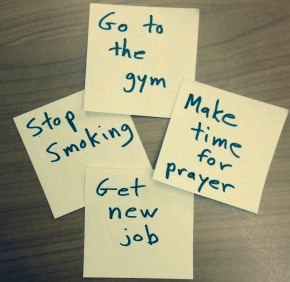By Erick Rommel
Catholic News Service
We’re already a few weeks into the new year. If you’re like me, you started with the best of intentions. But let’s be honest: Before the first few days of 2016 were checked off the calendar, we had already reverted back into many bad habits.
That’s not to say you didn’t want to change. But change is hard and doing things the way they’ve always been done is much easier. The problem isn’t your motivation or your desire to change. The problem is that your New Year’s resolutions were awful.
I’m not questioning your intent. I’m sure it was excellent. You really did mean to get accepted at the college of your dreams, or find a new job or change your attitude. The problem is that you invested time to set a goal but didn’t take the steps necessary to start achieving it.
Let’s say your resolution was to find a new job. Did you update your resume? Are you searching for jobs daily? Have you analyzed your strengths and weaknesses so you can talk about them when asked?
Imagining change is easy. Implementing change is difficult. That’s why I question most resolutions. What you want is probably a good thing, but to reach that goal, you need to think of the journey as much as the destination.
How do you get accepted to your dream school? How do you change your attitude? How will you lose weight?
Making a resolution is the first step in a process, not the last.
Fortunately, you can get from first to last in three steps: When the day is over, reflect on what happened, do the things you regret less often, and do the things you are proud of more often. It really is that simple.
Well, it’s not. Self-improvement is never simple, no matter what change you imagine. If it were easy, you’d already know what to do.
With that in mind, I suggest making a resolution that’s flexible enough to apply to any obstacle you desire to overcome, yet firm enough to give a strong challenge. Resolve to be a better person today than you were yesterday.
That’s my resolution, and every day I attempt to complete it by following simple guidelines. If they work for me, maybe they’ll work for you.
First, and most important: Trust your instincts. They’re there to guide you. You trust them when they tell you to avoid bad things. Trust them when they urge you to take a chance for good.
Don’t be afraid to say no. That word exists for a reason. Use it when appropriate, especially when your instincts tell you to. As a corollary, don’t be afraid to say yes. You can’t improve if you don’t attempt new experiences.
Finally, be kind to yourself. Realize that you’re your toughest critic. Lighten up and cut yourself some slack. Also, realize that being kind to yourself also means never speaking badly about yourself. If you’re wrong, admit it, but don’t insult your capabilities. There are plenty of others willing to do that for you.
I know these guidelines are difficult. Every day won’t be a success. That’s why resolving to be a better person today than yesterday is a great resolution. It lets you make mistakes. And if you fail, you can try again.
I start every day knowing what I want to accomplish and how I can make it happen. Tomorrow, I’m going to be even better, and you can be, too.
Click here for more commentary.
Copyright ©2016 Catholic News Service/U.S. Conference of Catholic Bishops.


